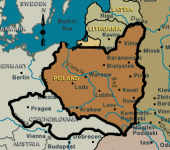I don't think a 1938 war ends up coming anywhere close to a conflict of that magnitude.
Well, what magnitude do you expect? The Germans not having time in occupation over *any* foreign territory or foreign populations to commit atrocities against?
I don't see why Poland would be worried about a Soviet attack when the Soviets had a defensive alliance with Czechoslovakia. If the Soviets have declared War on Germany, then Poland's got quite the free hand to jump on the anti-German dogpile.
You are missing an aspect of this (the Soviet-Czech alliance) that Poland could and should worry about. The Soviet Union and Czechoslovakia were not territorially contiguous in the interwar era. And the shortest route between them lay through Polish Galicia. The Soviet Union is likely to ask to borrow the roads and rails and airspace of southeastern Poland to send their armed forces to help the Czechs and combat the Germans. The Poles won't want to agree to Soviet passage because they will be afraid the Soviet forces will never leave anywhere they are allowed (after all, they have claims to some of this land on an ethnolinguistic basis and the Curzon Line), and may not obey any jurisdictional limits within Poland. The Poles may worry the Soviets might feel entitled to roll through Polish territory to aid the Czechs, with or without Polish permission. Indeed, a French military or diplomatic account from shortly before Munich recalls a Soviet answering his French counterpart's question about what the USSR plans to do specifically to help Czechoslovakia if Germany attacks, by saying, "of course, we attack Poland."
Japan doesn't have the leeway to expand South into Indochina. If they can't strike south, and Britain/France/America are funneling stuff to the Nationalists through Indochina in particular ... how long until Japan burns itself out in China?
1940 and 1941 - I'm skeptical, did not happen in OTL
1941-1942-1943 - I'm skeptical, the "burn out" did not happen in OTL's Pacific War, and in this ATL, Japan has 11 more Army Divisions retained in China and much more air force. Regarding oil, although in OTL's 1941-42 campaign it captured the Allied oilfields of DEI, Burma, Malaya, Borneo, Philippines, it did not get the damaged and sabotaged oil facilities back up to production and delivery north to China and Japan until middle or late 1943; plus, all the Pacific War/Southeast Asia combat *cost* a lot of fuel from the pre-war reserve.
The only net advantage to the China side is the supply lines for delivering it aid are more open, and aid donors should be just as generous as OTL if not more.
1944 could swing either way - if Soviets and Western Allies are generous to Chinese with supplies, and if Chinese despite factional competition and infighting, also stand up to Japanese attacks and conduct counter-attacks and make Japan pay a price for any expansion anywhere in China, Japan can really start hurting, running down resources.
But if Chinese don't get generous aid or mostly stockpile it for civil war, use it against each other, are too militarily passive, face famine, corruption, inflation, national dry rot, they could lose more ground like they did in OTL's Ichigo.
1945 Trend in either direction, or stagnation could continue
1946-47 same-same, both China and Japan are having some internal weakening, increased cynicism, heightened vulnerability if about outside power (more likely USSR, but possibly USA) wants to suddenly "get tough" and apply massive pressure or actual force.
and anyone else with an anti-German grunge - Denmark?
Why should little Denmark expose itself in this way? It already got back all this Danish-populated land it could reasonably want, without combat, through the Treaty of Versailles.




